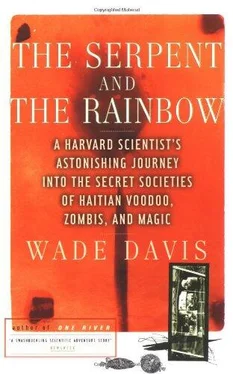Wade Davis - The Serpent and the Rainbow
Здесь есть возможность читать онлайн «Wade Davis - The Serpent and the Rainbow» весь текст электронной книги совершенно бесплатно (целиком полную версию без сокращений). В некоторых случаях можно слушать аудио, скачать через торрент в формате fb2 и присутствует краткое содержание. Год выпуска: 1985, Издательство: Simon & Schuster, Жанр: Старинная литература, на английском языке. Описание произведения, (предисловие) а так же отзывы посетителей доступны на портале библиотеки ЛибКат.
- Название:The Serpent and the Rainbow
- Автор:
- Издательство:Simon & Schuster
- Жанр:
- Год:1985
- ISBN:нет данных
- Рейтинг книги:5 / 5. Голосов: 1
-
Избранное:Добавить в избранное
- Отзывы:
-
Ваша оценка:
- 100
- 1
- 2
- 3
- 4
- 5
The Serpent and the Rainbow: краткое содержание, описание и аннотация
Предлагаем к чтению аннотацию, описание, краткое содержание или предисловие (зависит от того, что написал сам автор книги «The Serpent and the Rainbow»). Если вы не нашли необходимую информацию о книге — напишите в комментариях, мы постараемся отыскать её.
The Serpent and the Rainbow — читать онлайн бесплатно полную книгу (весь текст) целиком
Ниже представлен текст книги, разбитый по страницам. Система сохранения места последней прочитанной страницы, позволяет с удобством читать онлайн бесплатно книгу «The Serpent and the Rainbow», без необходимости каждый раз заново искать на чём Вы остановились. Поставьте закладку, и сможете в любой момент перейти на страницу, на которой закончили чтение.
Интервал:
Закладка:
“Yes?” he inquired in a resonant Bostonian accent. Face to face with a legend, I stumbled. Nervously and in a single breath I told him my name, that I came from British Columbia, that I had saved some money working in a logging camp, and that I wanted to go to the Amazon to collect plants. At that time I knew little about the Amazon and less about plants. I expected him to quiz me. Instead, after gazing for a long time across the room, he peered back at me through his antiquated bifocals, across the stacks and stacks of plant specimens that littered the table between us, and said very simply, “So you want to go to South America and collect plants. When would you like to leave?”
I returned two weeks later for a final meeting, at which time Professor Schultes drew out a series of maps and outlined a number of possible expeditions. Aside from that he offered only two pieces of advice. There was no point buying a heavy pair of boots, he said, because what few snakes I was apt to find generally bite at the neck; a pith helmet, however, was indispensable. Then he suggested enthusiastically that I not return from the Amazon without experimenting with ayahuasca, the vision vine, one of the most potent of hallucinogenic plants. I left his office with the distinct feeling that I was to be very much on my own. A fortnight later I left Cambridge for Colombia without a pith helmet, but with two letters of introduction to a botanical garden in Medellin and enough money to last a year, if spent carefully. I had absolutely no plans, and no perception at the time that my whimsical decision in the café at Harvard Square would mark a major divide in my life.
Three months to the day after leaving Boston, I sat in a dismal cantina in northern Colombia facing an eccentric geographer, an old friend of Professor Schultes’s. A week before he had asked me to join him and a British journalist on a walk across “a few miles” of swamp in the northwestern corner of the country. The journalist was Sebastian Snow, an English aristocrat who, having just walked from Tierra del Fuego at the tip of South America, now intended to walk to Alaska. The few miles of swamp referred to was the Darien Gap, 250 roadless miles of rain forest that separated Colombia from Panama. Two years previously a British army platoon led by one of Sebastian’s schoolboy friends had traversed the Darien Gap and, despite radio communication, had suffered several casualties, including two unpublicized deaths. Now the intrepid journalist wanted to prove that a small party unencumbered with military gear could do what Snow’s schoolmate’s military unit could not—traverse the gap safely.
Unfortunately, it was the height of the rainy season, the worst time of year to attempt such an expedition. By then I had some experience in the rain forest, and when Snow discovered I was a British subject he assumed that I would accompany him all the way. The geographer, on Snow’s instructions, was offering me the position of guide and interpreter. Considering that I had never been anywhere near the Darien Gap, I found the offer curious. Nevertheless I accepted, and gave the assignment little thought until the night before we were to depart, when in the clapboard town at the end of the last road before the rain forest an old peasant woman approached me on the street and offered an unsolicited appraisal of my situation. My hair was blond, she said, my skin golden, and my eyes the color of the sea. Before I had a chance to savor the compliment she added that it was too bad that all these features would be yellow by the time I reached Panama. That same night, to make matters worse, the geographer, who knew the region far better than I, somewhat mysteriously dropped out of the expedition.
The first days were among the worst, for we had to traverse the vast swamps east of the Rio Atrato, and with the river in flood this meant walking for kilometers at a time in water to our chests. Once across the Atrato, however, conditions improved, and without much difficulty we moved from one Choco or Kuna Indian village to the next, soliciting new guides and obtaining provisions as we went along. Our serious problems began when we reached the small town of Yavisa, a miserable hovel that masquerades as the capital of Darien Province, but is in fact nothing more than a catch basin for all the misfits exiled from each of the flanking nations.
In those days the Guardia Civil of Panama had explicit instructions to harass foreigners, and we were the only gringos the Yavisa post was likely to see for some time. We came expected. Already at a border post two days west of the frontier an unctuous guard had stolen our only compass; now at the headquarters we were accused of smuggling marijuana, an accusation which, however absurd, gave them the excuse to confiscate our gear. Sebastian became violent and did his best to prove his maxim that if one yells loudly enough in English, any “foreigner” will understand. This they did not find amusing. Things went from bad to worse when the sergeant, detailed to rummage through our gear, discovered Sebastian’s money. The mood of the commandant changed immediately, and with a smile like an open lariat he suggested that we enjoy the town and return to speak with him in the evening.
We had been walking for two weeks and had hoped to rest in Yavisa for a few days, but our plan changed with a warning we received that afternoon. After leaving the guardhouse I paddled upriver to an Australian mission post we had heard of, hoping to borrow a compass and perhaps some charts, for the next section of forest was uninhabited. One of the missionaries met me at the dock and acted as if he knew me well. Then, soberly, he explained that according to some of the Kuna at the mission, agents of the commandant intended to intercept our party in the forest and kill us for our money. The missionary, who had lived in the region for some years, took the rumor seriously and urged us to leave as soon as possible. I returned immediately to the jail, discreetly retrieved a few critical items, and then, abandoning the rest of our gear, told the commandant that we had decided to spend a few days at the mission before continuing upriver.
Instead, equipped with two rifles borrowed from the mission, and accompanied by three Kuna guides, we left Yavisa the next day before dawn, downriver.
Our problems began immediately. On the chance that we were being followed, the Kuna led us first up a stone creek bed and then, entering the forest, they deliberately described the most circuitous route possible. Sebastian stumbled, badly twisting an ankle. That first night out we discovered what it meant to sleep on the forest floor at the height of the rainy season. In a vain attempt to keep warm, the three Kuna and I huddled together, taking turns in the middle. Nobody slept. By the end of the second day I had begun to suspect that our riverine Kuna were less than familiar with the forest hinterland, and after three days I realized they were completely disoriented.
Читать дальшеИнтервал:
Закладка:
Похожие книги на «The Serpent and the Rainbow»
Представляем Вашему вниманию похожие книги на «The Serpent and the Rainbow» списком для выбора. Мы отобрали схожую по названию и смыслу литературу в надежде предоставить читателям больше вариантов отыскать новые, интересные, ещё непрочитанные произведения.
Обсуждение, отзывы о книге «The Serpent and the Rainbow» и просто собственные мнения читателей. Оставьте ваши комментарии, напишите, что Вы думаете о произведении, его смысле или главных героях. Укажите что конкретно понравилось, а что нет, и почему Вы так считаете.












